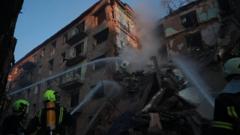This summit could reshape NATO dynamics and the U.S.-Europe relationship amid rising security concerns.
**A Pivotal NATO Summit: The U.S., Europe, and Military Spending Dynamics**

**A Pivotal NATO Summit: The U.S., Europe, and Military Spending Dynamics**
As President Trump heads to the Netherlands for a crucial NATO summit, tensions over military obligations and responses to global crises are palpable.
In a time of heightened global tension, all eyes are set on the Netherlands where U.S. President Donald Trump is poised to attend a decisive NATO summit on Tuesday. Given the recent U.S. military actions against Iran, this gathering, marking Trump’s first NATO meeting since his re-election, could be one of the most critical since the Cold War. European nations are under pressure to demonstrate unity and commitment, especially after prior frustrations over Trump’s critiques of allied contributions to defense spending.
European allies are keen to reassure Trump of their commitment to NATO, particularly in light of his past accusations of freeloading. “Relations have soured significantly since Trump resumed office,” said a senior diplomat, who requested anonymity. “His presence at this summit is vital to maintain a perception of Western strength, particularly with adversaries like Russia and China watching closely.”
NATO Secretary General Mark Rutte has designed the agenda with Trump in mind, emphasizing increased defense spending to showcase Europe’s willingness to share security burdens. Discussions around a substantial commitment from European nations to allocate 5% of GDP to defense were anticipated, but operational unity may prove challenging. Spain’s assertion of an opt-out from this financial commitment has stirred discontent among its allies.
Yet, the backdrop of military escalation in the Middle East complicates the agenda. With Iran's retaliatory missile strikes targeting U.S. bases, the imperative to address Middle Eastern tensions could overshadow discussions around NATO’s financial commitments. The expectation is that Trump will advocate for a narrative of American superiority in defense spending while managing internal dissent among NATO members.
Despite historical dependencies on U.S. security, Europe finds itself in a position where greater self-reliance is paramount. The necessity for European nations to bolster their defenses, exemplified by countries like Poland—self-funding defense at 4.7% of GDP—highlights varying perceptions of threat across the continent.
The summit's outcomes are uncertain, particularly concerning a final declaration of mutual threats, addressing Russia’s aggressive posturing, and committing to spending targets that reflect a unified stance. While the 5% goal has been presented as crucial for credibility, the economic realities of achieving such targets invite further debate, potentially influencing domestic policy across Europe.
The NATO summit arrives at a pivotal moment in history, as leaders grapple with the balance of autonomy and alliance in the face of emerging global challenges, underscoring questions about America's future role and commitment to European defense.
European allies are keen to reassure Trump of their commitment to NATO, particularly in light of his past accusations of freeloading. “Relations have soured significantly since Trump resumed office,” said a senior diplomat, who requested anonymity. “His presence at this summit is vital to maintain a perception of Western strength, particularly with adversaries like Russia and China watching closely.”
NATO Secretary General Mark Rutte has designed the agenda with Trump in mind, emphasizing increased defense spending to showcase Europe’s willingness to share security burdens. Discussions around a substantial commitment from European nations to allocate 5% of GDP to defense were anticipated, but operational unity may prove challenging. Spain’s assertion of an opt-out from this financial commitment has stirred discontent among its allies.
Yet, the backdrop of military escalation in the Middle East complicates the agenda. With Iran's retaliatory missile strikes targeting U.S. bases, the imperative to address Middle Eastern tensions could overshadow discussions around NATO’s financial commitments. The expectation is that Trump will advocate for a narrative of American superiority in defense spending while managing internal dissent among NATO members.
Despite historical dependencies on U.S. security, Europe finds itself in a position where greater self-reliance is paramount. The necessity for European nations to bolster their defenses, exemplified by countries like Poland—self-funding defense at 4.7% of GDP—highlights varying perceptions of threat across the continent.
The summit's outcomes are uncertain, particularly concerning a final declaration of mutual threats, addressing Russia’s aggressive posturing, and committing to spending targets that reflect a unified stance. While the 5% goal has been presented as crucial for credibility, the economic realities of achieving such targets invite further debate, potentially influencing domestic policy across Europe.
The NATO summit arrives at a pivotal moment in history, as leaders grapple with the balance of autonomy and alliance in the face of emerging global challenges, underscoring questions about America's future role and commitment to European defense.






















